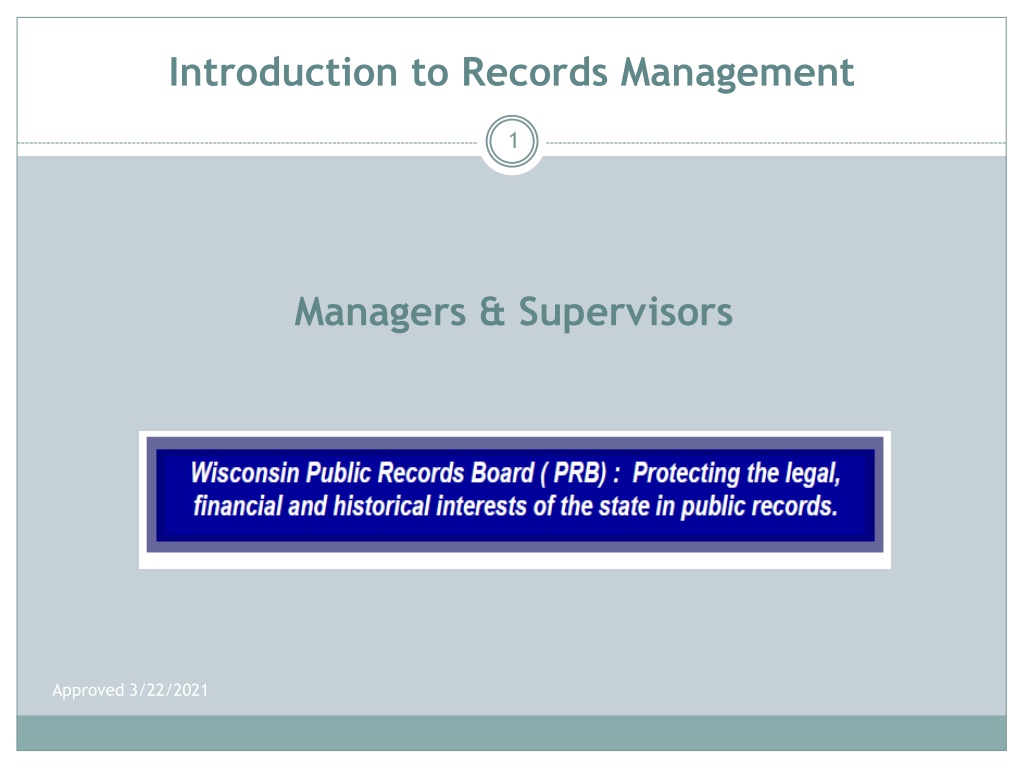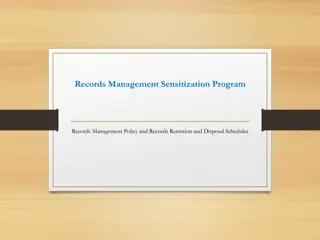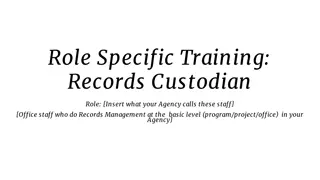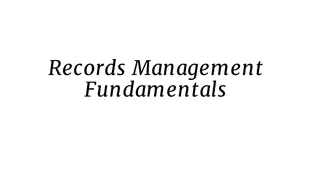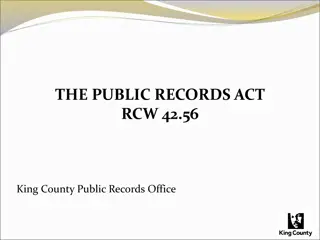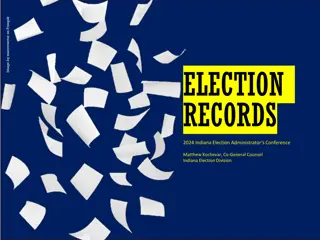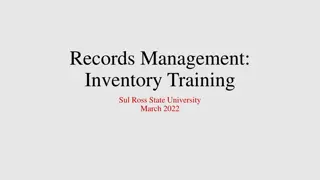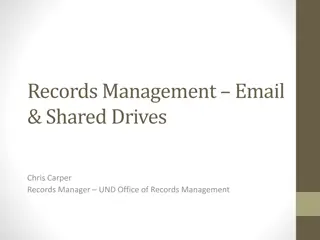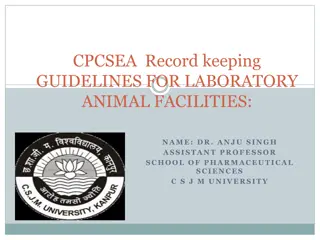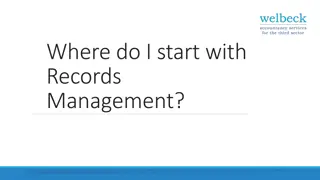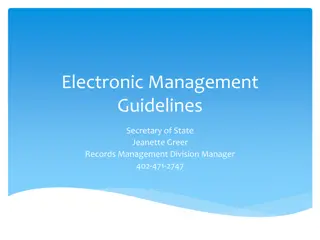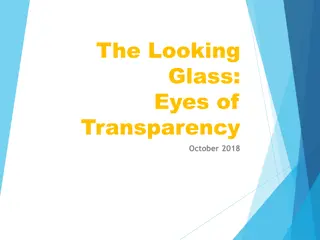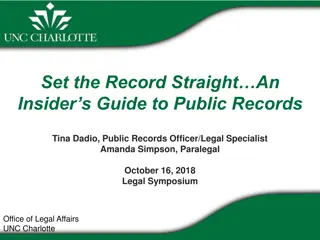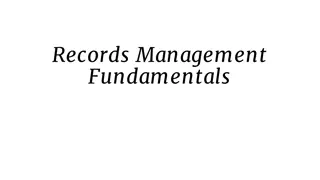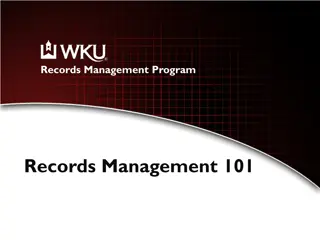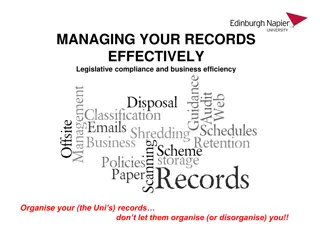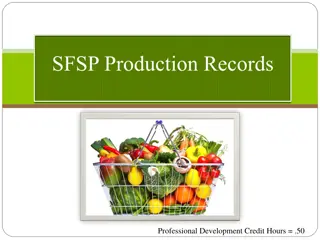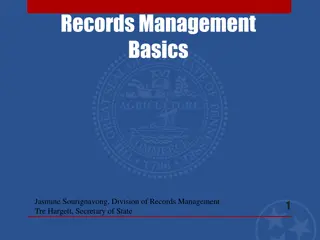Public Records Management Best Practices
Learn about public records management, including the definition of public records, the importance of records management, the life cycle of a record, why public records management is essential, and your responsibilities in managing public records effectively.
Download Presentation

Please find below an Image/Link to download the presentation.
The content on the website is provided AS IS for your information and personal use only. It may not be sold, licensed, or shared on other websites without obtaining consent from the author. Download presentation by click this link. If you encounter any issues during the download, it is possible that the publisher has removed the file from their server.
E N D
Presentation Transcript
Introduction to Records Management 1 Managers & Supervisors Approved 3/22/2021
Where Are Public Records Defined? 2 Wis. Stat. 16.61(2)(b) defines public records for the purposes of records retention and disposition Wis. Stat. 19.32(2) defines records for purposes of the records access and disclosure provisions of Wis. Stat. 19.31-19.39 (known as the public records law or the open records law)
What is Records Management? 3 The practice of maintaining records throughout their lifecycle Records management programs manage organizational information to ensure it is useable, cost-effective, timely, accurate, complete and easily accessible Disposing of unneeded and outdated content after the appropriate retention period allows for easier retrieval of records
Why Public Records Management? 5 Ensure statutory and regulatory compliance Preserve the rights of citizens to have access to public records Support better decision making Safeguard vital information Preserve organizational memory Reduce operating costs Minimize legal risks
What Are Your Public Records Responsibilities? 6 Ensure staff has basic knowledge about records management Document program area business activities and decisions Know program area business records and ensure they managed according to an approved records disposition authorization (RDA) Ensure public records are disposed in accordance with an approved RDA
What Are Your Public Records Responsibilities? 7 Continued Safeguard confidential, sensitive, and personally identifiable information (PII) such as personnel records Communicate records roles and responsibilities to your employees Ensure records are filed for safe storage and efficient retrieval Identify and transfer records prior to employee departures Have a method to identify legal holds that halt records disposition
What Are Your Staffs Public Records Responsibilities? 8 Recognize and manage public records created as part of their job duties Protect and save public records they create and use File paper and electronic documents so they can be readily accessed (use agency file plan if applicable) Safeguard confidential and sensitive information Dispose of information that is not defined as a public record Retain public records for the appropriate length of time Dispose of public records in accordance with an approved Retention Disposition Authorization (RDA) Know where to go for help
What is a Public Record? 9 Recorded information, in any format (including paper, electronic, audio/visual, calendars, maps) created or received by a state employee and/or agency in the transaction of business Information content determines what is a record and not the format in which the information is generated. Records may be textual, pictorial, paper, electronic, audio, video, etc.
What is a Public Record? 10 Created in the course of public business Examples: correspondence and memos (paper and electronic), agreements, studies, reports Received for action Examples: Information or public records requests, tracked correspondence Mandated by statute or regulation Examples: statutorily required programs, administrative records, dockets, equal rights complaints
Where Might Public Records Occur? 11 Information content determines what constitutes a public record and not the format in which the information is generated. Email and voicemail Text, instant messages and chats Social media and Websites Audio, video and online meeting platform recordings Calendars Documents Spreadsheets and databases Personal devices if used for government unit business Maps and blueprints
What Public Records Might You Have? 12 Records pertaining to Boards, Councils, and Committees Policy and procedure documentation Program area activity, production and employee reports and files Project reports and files Business related memos or correspondence Open records requests and responses Reports to senior management Calendars, schedules and logs of daily activities
What Is Not a Public Record under Wis. Stat. 16.61(2)(b) for retention purposes? 13 Reference materials and stock copies Examples: vendor catalogs, blank forms Copies Examples: copies of records (paper or electronic) for convenience or reference purposes only Draft or working papers Examples: draft documents without substantive comments, rough notes for personal use (It should be noted that some drafts are needed to support a decision trail or are otherwise required by an RDA) Unsolicited email (internal or external) Examples: reminders received by all staff, listserv
How Do I Manage Public Records? 14 Policies Learn your government unit s records management policies Know which records disposition authorization (RDA) relates to your program records Filing File public records to allow for easy access over time File records in accordance with your government unit s approved filing system to simplify retrieval
How Do I Manage Public Records? 15 Continued People Contact your Records Officer or designated Records Custodian with questions Disposition Dispose of records according to the approved RDA Note: Your government unit may only legally dispose of records as approved by an authorized records schedule
What Is A Retention / Disposition Schedule? 16 Records Disposition Authorizations (RDAs): Mandate how long public records are kept (retention) Group and describe related public records Mandate what happens to public records at the end of that time period (disposition) Are promulgated as policy via a General Records Schedule (GRS) or agency specific RDA
Records Disposition Authorizations 17 Valid for ten years Updated, amended and revised as needed Changes are approved by the Public Records Board RDAs may be extended beyond their sunset day for an additional 18 months in accordance with PRB Extension policy (approved May 2010)
PRB General Records Schedules 18 Administrative Related Records Budget and Related Records County Records Facilities Management and Related Records Fiscal and Accounting Related Records Fleet and Aircraft Management Related Records Human Resources and Related Records Information Technology and Related Records Municipal Records Payroll and Related Records Public Library and Public Library Systems Public School District Records Purchasing and Procurement and Related Records Risk Management and Related Records
Summary 19 Protect and save the public records your unit creates and uses Safeguard confidential and sensitive information appropriately Know that public records consist of all forms of media Be familiar with the RDAs which relate to your programs Do not dispose of any public record unless you are following an RDA File all public records according to a consistent filing plan Learn to manage public records as part of your job duties Ask records staff for assistance Records Officer Legal counsel Records Coordinators Records Custodians
